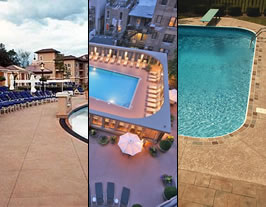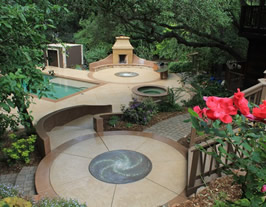GUIDE TO SEALING CONCRETE AROUND A POOL
Whether you're having a beautiful new concrete pool deck poured or you already have one, it's important that you protect your investment. A good concrete sealer will keep your pool deck looking great for many years, or rejuvenate an existing surface.
Why you should seal your concrete pool deck
Sealing a concrete pool deck can be compared to waxing your car, wearing sunscreen or spraying Scotchgard™ on your favorite shirt.
A sealer will:
- Improve your pool deck's appearance
- Prevent fading caused by UV rays
- Protect it from stains and harmful pool chemicals
Find concrete pool deck contractors near me.
Enhance your pool deck with a sealer
Whether your pool deck is plain gray concrete, stained concrete or has a stamped texture, sealing after the concrete has cured and every few years after is recommended. A sealed concrete pool deck will have a rich color and glossy sheen if desired. For colored concrete pool decks, a sealer will help prevent efflorescence, which is a white powdery residue that can form on the surface.
Pool deck sealer options include:
- Sealers are available in many different gloss levels, ranging from no-gloss to high-gloss.
- A tinted sealer can even be used that will further enhance the color of your pool deck.
- Slip resistant sealers make accidents less likely when water is splashed onto the pool deck.
Protect your pool deck from stains and cracking
Protection against stains is another benefit of sealing a concrete pool deck. Your pool deck will be subjected to many things that can leave stains on the surface – chlorine, salt, chemicals, leaves, dirt, fertilizer, pet urine, and more. The right sealer will keep all of these from penetrating the surface of the concrete and leaving unsightly stains.
If you live in a cold climate, sealing your pool deck will reduce the chance of freeze thaw damage. Freeze thaw damage can cause cracks or surface flaking. It is caused by water penetrating the concrete surface and then expanding as it freezes. A sealer will keep water from sinking into your pool deck. Water should bead up on the surface of the concrete if your sealer is doing its job. If this is not happening, it's time to reseal your pool deck. High traffic areas will likely need resealing on a frequent basis.
Try these pool deck sealers
Here are five professional-grade pool deck sealants to consider:
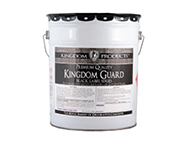
- Kingdom Guard’s unique formulation provides superior water and salt resistance, making it a good choice for sealing pool decks with salt water systems.
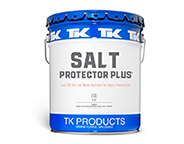
- Salt Protector Plus is formulated to penetrate and protect residential concrete pool decks and other surfaces. It is non-film forming, which means it won’t make the surface slippery.
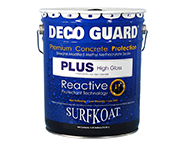
- Deco Guard Plus is recommended for use on new or existing pool decks because of its superior water and salt resistance. It is non-yellowing, and high gloss.
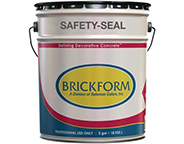
- Safety-Seal will protect your concrete pool deck while enhancing appearance and improving safety. It comes premixed with anti-slip additives.
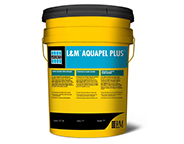
- L&M™ AQUAPEL™ is highly resistant to the attacks of both moisture and salt. Plus, it leaves pool deck surfaces breathable by allowing moisture to escape without compromising protection.
Tips for sealing a concrete pool deck
In summary, a sealer will enhance and protect your new or existing swimming pool deck. When properly sealed and/or resealed the service life of concrete is greatly extended.
- Make sure that the contractor you hire seals your pool deck with the appropriate product and at the appropriate time.
- With new concrete, a pool deck sealer should be applied after curing. Most contractors have success waiting 7 to 14 days, but the official time for curing is 28 days.
- Experts recommend using a penetrating or film-forming sealer outdoors and selecting a more natural, matte finish.
- Keep in mind that it is very important that sealers used on exterior concrete allow both air and moisture to pass through.
- If you are having your pool deck stamped, sealing is even more important. Learn more about sealing stamped concrete.


